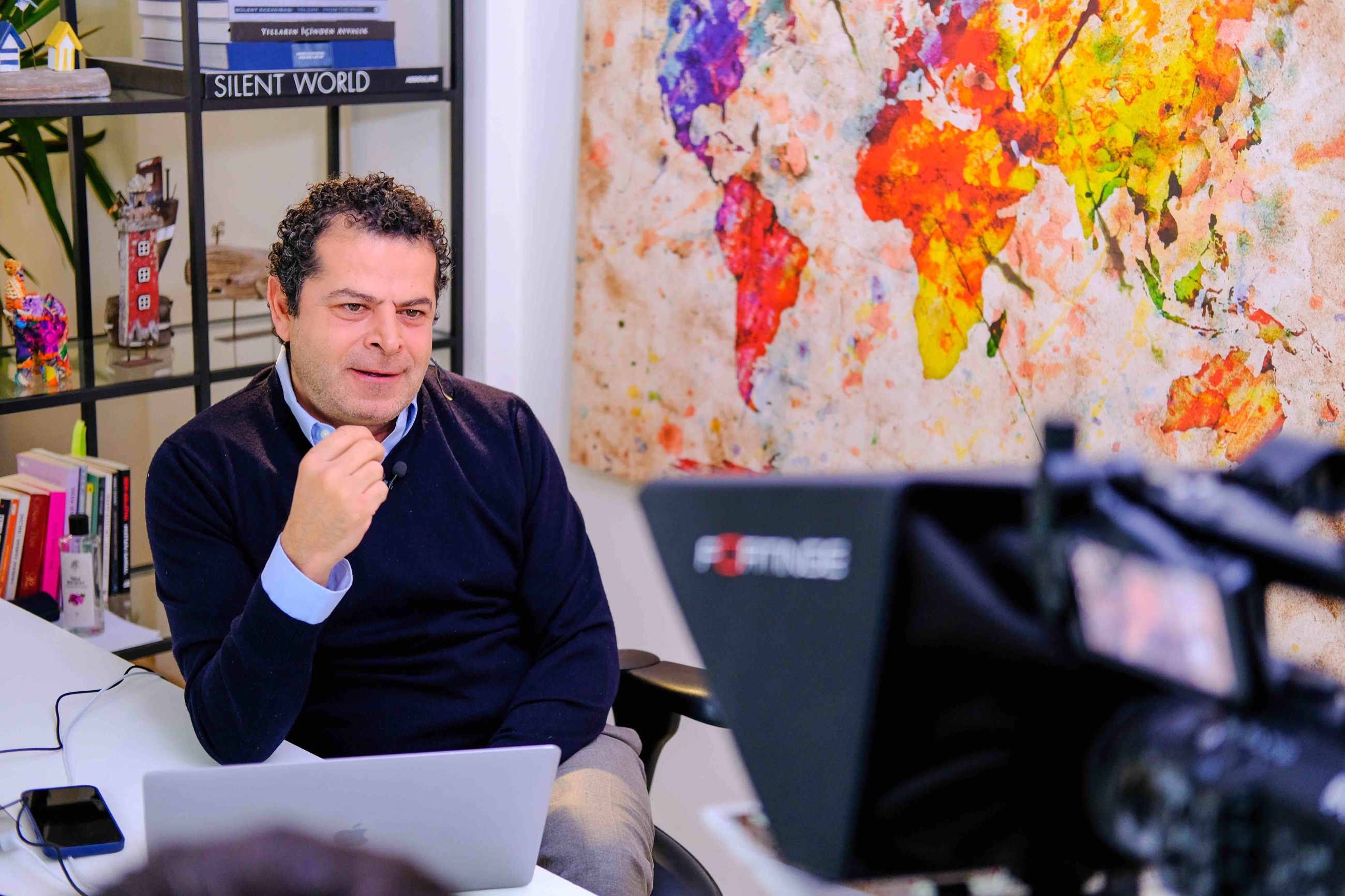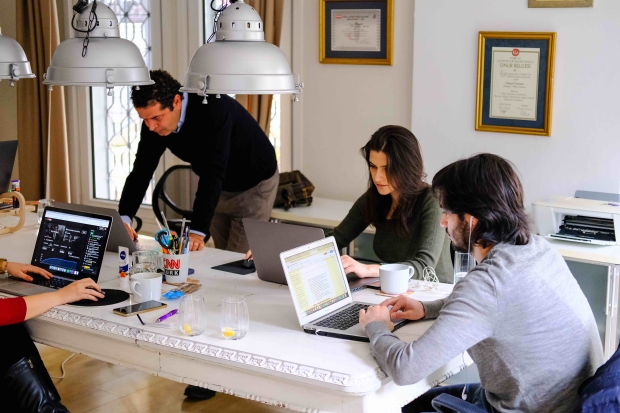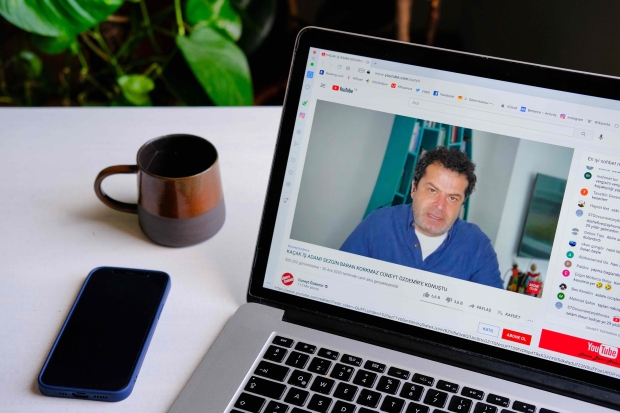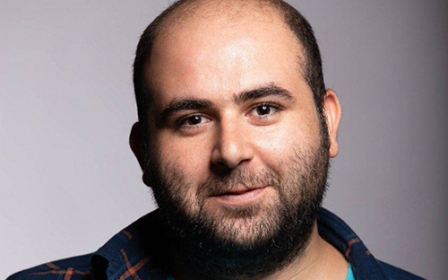How a YouTuber became the go-to news source in Turkey

It was total silence, the kind never seen in Turkey except during military coups.
When Turkey’s second most powerful man, Berat Albayrak, resigned as the minister of treasury and finance in November, not a sniff of the news was to be found on any major Turkish TV channels for 24 hours.
The stations' coverage kept rolling, of course. Regularly scheduled programming was uninterrupted, even on channels known for their editorial lines critical of the government. But the bombshell resignation letter posted by President Recep Tayyip Erdogan's son-in-law on Instagram went ignored.
The silence was broken that night, however, by a YouTube newscast.
On 9 November, journalist Cuneyt Ozdemir started a live broadcast discussing the background of the resignation with several guests, including a pro-government columnist with close ties to the Albayrak family.
'People are in need of news. They would like to hear the accurate news, and different opinions. They are of course curious'
- Cuneyt Ozdemir
The result was stunning: at 3am, Ozdemir had more than 150,000 viewers still up, still watching. In total, more than a million people learned the important development from his show.
“People are in need of news,” Ozdemir tells Middle East Eye. “They would like to hear the accurate news and different opinions. They are of course curious.”
Today, Ozdemir's daily show on YouTube and other platforms reaches more than 500,000 viewers across the country, a number that could put him on a par with major American news shows on cable, such as The Story with Martha MacCallum on Fox.
His YouTube channel has emerged as a mainstream news source that people regularly tune into. His guests include ministers, senior ruling party officials, opposition leaders and MPs, prominent businessmen and sometimes experts that have little or no following.
Ozdemir isn’t an amateur YouTuber that turned into a journalist. It is vice-versa. After spending more than 30 years on Turkish TV, and being one of the co-founders of CNN Turk, he moved to new media in 2017.
Attracting younger generations
The reasons for such a move are clear: nearly 85 percent of news media is controlled by government-aligned corporations, and Turkey has been sliding downhill in press freedom indexes for nearly a decade, becoming neighbours of repressive countries such as Belarus and Rwanda in the rankings.
Taner Dogan, academic and author of Communication Strategies in Turkey: Erdogan, the AKP and Political Messaging, says that news consumption has greatly changed in Turkey, with conventional media becoming more pro-government since the 2016 coup attempt.
He believes younger generations are also more engaged with online news sources, which is motivating everyone to do more on digital media.
“That is why a new social media law was introduced by Erdogan last year to control the narrative on digital media and limit freedom of speech,” Dogan says.
The turning point for Ozdemir, after which he began using YouTube as a chief platform, was the beginning of a New York trial into the breaching of sanctions on Iran, which involved a senior official from Turkey’s state lender Halkbank in 2017.
The star witness for the trial was Turkish-Iranian gold trader Reza Zarrab, whose gargantuan international money-laundering scheme and ties to the Erdogan family made the issue very sensitive for Turkish news channels. Everyone was careful on air about what to report on the case, and how to say it.
Ozdemir was living in New York at the time and hosting his weekly show 5N1K for CNN Turk.
A colleague remembers the issues they faced.
“Cuneyt and I were told to not cover the trial. Imagine, a groundbreaking story was on our laps and we weren’t allowed to report on it,” says Cansu Camlibel, who at the time was reporting as Washington correspondent for Hurriyet daily, a sister publication of CNN Turk.
'Cuneyt and I were told to not cover the trial. Imagine, a groundbreaking story was on our laps and we weren’t allowed to report on it'
- Cansu Camlibel, journalist
“He was particularly demoralised by it. He was thinking that it was crazy for us to just watch it and let it go.”
The trial had a huge following in Turkey, from government circles to the opposition. Zarrab’s testimony included damaging allegations against the senior Turkish leadership, including current and former ministers.
People were desperately looking for a source to get timely and accurate updates on the proceedings, as Turkish TV was left seriously lacking.
“I had an idea. I told him to go for YouTube. There were amateurs broadcasting outside the court, reaching thousands of people. And he was a journalist with 30 years of TV experience,” recalls Camlibel, who is currently the editor-in-chief of independent news platform Duvar English. “He could do much better.”
So Ozdemir began to report live from outside the courtroom. He didn’t even have a tripod or a mic, asking friends to hold his phone for him. In time, his broadcasts began to attract a loyal following.
“I used my Twitter and Instagram as a distributor. More and more people came for the content,” Ozdemir remembers.
'We look for topics that have the buzz'
He was reaching over 50,000 people a day. “Even high-ranking officials from the ruling party called me at the time and congratulated me for the job I was doing,” Ozdemir says. “Like everyone else, they too wanted to have access to accurate information.”
In time, his following increased and his YouTube channel began to attract hundreds of thousands of viewers. His channel now has over a million subscribers. “We just monitor the day and look for the topics that have the buzz. And then we just simply cover them, but with open eyes and ears,” he says.
Ozdemir's impact on news consumption has reached a level that people are eager to appear on his show to reach the Turkish public.
Just last month, Sezgin Baran Korkmaz, a fugitive Turkish businessman who is accused of laundering tens of millions of dollars, asked to appear on the show to tell his side of the story. More than half a million people tuned in, and Turkish news websites and broadcasts used clips in their reporting.
Ozdemir now has a team of 11 editors, reporters and technicians - a mini newsroom. How does he fund it?
“I think what he did is particularly impressive because he created a business model as well,” Camlibel says. “He makes money.”
On the face of it, Ozdemir’s recipe for success is simple. He has become a YouTube partner, receiving an income for the views he has on the platform.
He struck a similar deal with Facebook, where he simultaneously broadcasts. Ozdemir also breaks up his newscasts with advertising segments that he himself presents.
“We are very picky about what we run, and we have been very transparent about it,” he says. “We also get contributions and donations from volunteers all across the world. We are grateful for it, but they aren’t sufficient.”
However, his editorial stance has attracted criticism.
Some journalists interviewed by MEE, who wish to remain anonymous, claim that Ozdemir hasn’t been taking any strong stances against the government, instead placating Ankara by praising Erdogan’s achievements on highways or healthcare.
Dogan, the academic, thinks his messaging cannot be described as balanced or independent because his main intention is to not irritate ruling party officials, but to reach the younger generations who are either from conservative families or still in search of a political identity.
“He does this by focusing on a popular culture-style language,” Dogan adds. “When he criticises the government, he uses an engaging and entertaining positive articulation, leading to constructive criticism rather than a harsh critical framing.”
Encouraging others to follow suit
Ozdemir often takes walks and trips to different parts of Turkey and the world to record segments, in which he tells tales and jokes and talks about his personal life, engaging with the younger audience.
'When Ozdemir criticises the government, he uses an engaging and entertaining positive articulation, leading to constructive criticism rather than a harsh critical framing'
- Taner Dogan, academic and author
Camlibel thinks Ozdemir has been trying something experimental for Turkish journalism.
“He wants to be neutral when engaging with the news. This could be good for the country,” she says. “However, considering the situation in Turkey, being super neutral might not be the best approach.”
When asked about the criticisms, Ozdemir says he doesn't perceive them as attacks.
“They sound like compliments and endorsements rather than criticism,” he says. “I’m trying to be a mainstream voice, someone that sits in the middle and presents everything without any prejudice or taking a side.”
Ozdemir’s success on YouTube has encouraged other Turkish journalists to follow suit. Nevsin Mengu, a prominent journalist who also has a YouTube channel, believes Ozdemir serves as a good example of online opportunities.
“Digital media determines the daily news cycle in Turkey, rather than the conventional media,” she says. “Because you can no longer find news on so-called mainstream TV channels. They employ conspiracy theorists as commentators.”
Many believe the rise of digital media such as YouTube-based journalism and independent blogs will continue to shape politics in Turkey.
“Bearing in mind that seven million digital natives will vote for the first time in the 2023 elections, digital platforms like Ozdemir’s YouTube channel will play a significant role in the ruling party's communication in the next election,” Dogan says.
Middle East Eye propose une couverture et une analyse indépendantes et incomparables du Moyen-Orient, de l’Afrique du Nord et d’autres régions du monde. Pour en savoir plus sur la reprise de ce contenu et les frais qui s’appliquent, veuillez remplir ce formulaire [en anglais]. Pour en savoir plus sur MEE, cliquez ici [en anglais].







